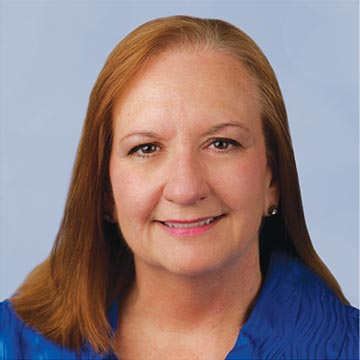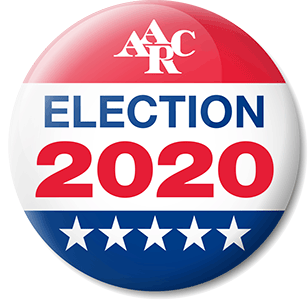President Elect
Lynda Goodfellow, EdD, RRT, AE-C, FAARC
Professor and Senior Associate Dean for Academic Affairs
Georgia State University
Member Since: 1980
AARC Activities:
- Officer Positions:
Secretary/Treasurer, 2018–2019
Vice-President of Internal Affairs, 2015–2016 - Board Positions:
Director-at-Large, 2012–2014 - Committee Chairs
Chair — Ad Hoc Committee on AS to BS Conversion, 2019
Chair — Vision Grant Committee, 2018, 2019
Co-Chair — Ad Hoc Committee on BS Entry to Practice, 2018
Chair — Ad Hoc Research Committee, 2016, 2017
Chair — Task-force on Competencies for Entry into Respiratory Therapy Practice, 2016
Co-Chair — Ad Hoc committee on 2015 and Beyond, 2011–2014 - Committee Membership:
Executive Committee, 2015, 2016, 2018, 2019
Finance Committee, 2015, 2016, 2018, 2019
2025 Issue Paper Writing Group, 2018, 2019
Audit Sub-Committee — 2018, 2019
Position Statements Committee, 2019
Member — Ad Hoc Committee on Advanced RT Practices, Credentialing, and Education, 2016–present
PACT — 2002–2004, 2016 - Membership Sections:
Chair, Education Section 2009–2011
Chair-Elect, Education Section, 2008
Member — Education Section, 1995 to present
Member — Management Section, 2015–present
HOD Activities:
- Delegate Positions:
Delegate, Georgia Society for Respiratory Care, 1990–1991
Alternate Delegate, Georgia Society for Respiratory Care, 1988–1989 - Committee Chair:
Scrutinizing Committee, 1992
Affiliate Activities:
- Officer Positions:
Past-President, Georgia Society for Respiratory Care, 1994
President, Georgia Society for Respiratory Care, 1993
President-Elect, Georgia Society for Respiratory Care, 1992
Secretary, Georgia Society for Respiratory Care, 1986–1987 - Committee Chairs:
Legislative Committee Chair — Georgia Society for Respiratory Care, 1995–2004
Nominations Committee, Georgia Society for Respiratory Care, 1994 - Committee Member:
Region VI- Program Committee, 1992–1995
Budget Committee, Georgia Society for Respiratory Care, 1992–1994
Audit Committee, Georgia Society for Respiratory Care, 1992–1994
Program Committee, Georgia Society for Respiratory Care, 1984–1985
Related Organizations:
- Director — National Asthma Education Certification Board (NAECB), 2014–2016
- Member — Association of Asthma Educators 2004–present
- Associate Member Georgia Thoracic Society (now Southeast Thoracic Association) 2000–2018
- Certified Basic Life Support Instructor, American Heart Association, 1986–1994, 2005–2011
- Advanced Cardiac Life Support Instructor, American Heart Association, 1990–2007
Education:
- EdD Adult Education, University of Georgia, 1999
- MBA Kennesaw State College, 1989
- BS Respiratory Therapy, Medical College of Georgia, 1982
Publications:
- Almojaibel AA, Munk N, Goodfellow LT, Miller KK, Fisher T. Development and Validation of the Tele-Pulmonary Rehabilitation Acceptance Scale. Respir Care (refereed). Data-based manuscript. In Press (DOI: 10.4187/respcare.06432)
- Alqahtani M, Goodfellow LT, Zimmerman RD, Zavorsky GS. (2019) Waterpipe Smoking in Healthcare Students at an Urban Research Southeastern University: Prevalence, Knowledge, Attitudes and Motives. Respir Care, 64 (3) 321-327; Data-based manuscript. (refereed). DOI: https://doi.org/10.4187/respcare.06263
- Zavorsky GS, Zimmerman RD, Shendell DG, Goodfellow LT. (2019) Acute Reduction in Spirometry Values after Prolonged Exercise among Recreational Runners. Respir Care, 64(1):26 -33. Data-based manuscript, (refereed). DOI:10.4187/respcare.05881.
- Culbreath RR, Goodfellow LT. (2016) ECMO and prone positioning in respiratory failure: a systematic literature review. Respir Care, 61 (2) 249-254. (Data-based manuscript, (refereed).
Elections Committee Questions:
What experience or significant contributions do you have to offer the AARC which would help accomplish one or more of the AARC Horizon Goals as presented by President Schell?
I was President of the Georgia Society for Respiratory Care (GSRC) in 1993, the year that state licensure (Georgia HB 491) became law. I recall the consensus and networking skills that GSRC members exemplified during this process, which clearly changed the practice of respiratory therapy in Georgia. Since 2008, my involvement with the AARC on the 2015 and Beyond conferences, and now the RRT for licensure and AS to BS Entry-to-Practice committees are equally significant. Registered Respiratory Therapists with bachelor’s degrees are essential for a well-prepared workforce capable of meeting the demands of healthcare and patient safety. The longer we wait, the greater the marginalization. The best pathway to enhancing the quality of care, differentiating the role of the respiratory therapist, and for ensuring patient safety in all practice locations is through the AARC Horizon Goals. These goals are achievable and I look forward to leading the AARC in this endeavor.
What ideas would you present to increase AARC membership?
My AARC membership is important to me because I belong to a group of professionals with like-minded values. However, “AARC non-member” is what some of our colleagues seem to prefer. I have often wondered “Why?” Perhaps we have failed to demonstrate that being a “non-member” is not good for your career and leads to a lack of opportunity. Evidence for this was found whereby the only variable that rated statistically significantly higher by current members as compared to former members was “improvement of my work."(J Perianesth Nurs. 2003 Feb;18(1):8-17). Each of us as members must speak to our colleagues, staff and students about AARC membership. Just as in student recruitment, when an educator makes a personal connection to a student, they are likely to attend your program. I believe a personal contact to non-members is a good way to connect for membership. To me, it is worth a conversation of knowing why “Non-Member" is their preferred membership!
Role-Specific Questions:
What experience can you leverage as AARC President to continue the work of your predecessors and gain momentum for the benefit of the profession?
I have a long-sustained history of active participation at the state level, as a specialty section member, and as an officer on the AARC Board of Directors in strategic and long-range planning. I also served on the National Asthma Educator Certification Board. Lastly, as Senior Associate Dean of the Lewis College of Nursing and Health Professions at Georgia State University, I am allowed to function as the Dean’s proxy and am able to lead and manage in a variety of business and information situations. These experiences and my familiarity with the direction mapped by my predecessors dating back to Dr. Toni Rodriquez’ tenure in 2008 will serve me well as AARC President. Their leadership skills have proven to move the profession forward. I will continue to move the profession forward by working with our membership and with other organizations to advance the value and worth of all respiratory therapists who are the “airway expert” to the patients we serve.







